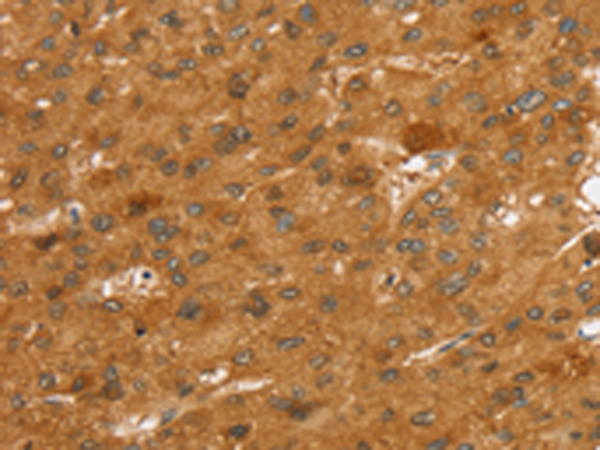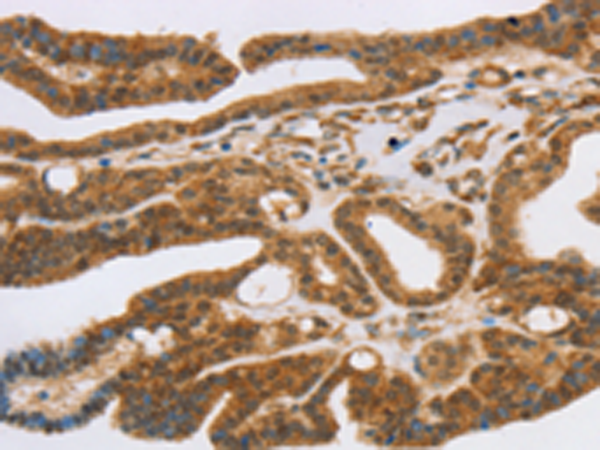

| WB | 咨询技术 | Human,Mouse,Rat |
| IF | 咨询技术 | Human,Mouse,Rat |
| IHC | 1/25-1/100 | Human,Mouse,Rat |
| ICC | 技术咨询 | Human,Mouse,Rat |
| FCM | 咨询技术 | Human,Mouse,Rat |
| Elisa | 1/2000-1/5000 | Human,Mouse,Rat |
| Aliases | BAT1; CSNU3 |
| Host/Isotype | Rabbit IgG |
| Antibody Type | Primary antibody |
| Storage | Store at 4°C short term. Aliquot and store at -20°C long term. Avoid freeze/thaw cycles. |
| Species Reactivity | Human |
| Immunogen | Synthetic peptide of human SLC7A9 |
| Formulation | Purified antibody in PBS with 0.05% sodium azide and 50% glycerol. |
+ +
以下是关于SLC7A9抗体的3篇参考文献的简要总结:
---
1. **文献名称**:*Mutations in SLC7A9 cause autosomal recessive cystinuria*
**作者**:Calonge MJ et al.
**摘要**:该研究通过免疫印迹和免疫组化技术,利用SLC7A9抗体分析肾脏组织中蛋白表达,发现SLC7A9基因突变导致胱氨酸尿症患者肾小管上皮细胞中胱氨酸转运功能缺陷。
---
2. **文献名称**:*Functional analysis of SLC7A9 variants in cystinuria patients using a novel antibody*
**作者**:Gasparini P et al.
**摘要**:研究开发了一种特异性SLC7A9抗体,用于检测患者细胞系中蛋白的亚细胞定位及表达水平,揭示了不同突变对蛋白稳定性和转运活性的影响。
---
3. **文献名称**:*Immunohistochemical characterization of SLC7A9 in the human kidney*
**作者**:Feliubadaló L et al.
**摘要**:利用SLC7A9抗体进行肾脏组织免疫组化分析,发现其在近端肾小管上皮细胞高表达,并探讨其在氨基酸重吸收中的关键作用,为遗传性胱氨酸尿症的病理机制提供依据。
---
这些文献均通过SLC7A9抗体探究该蛋白的表达、功能及其与疾病的关系,涉及基础研究与临床诊断应用。
The SLC7A9 antibody is a research tool designed to detect and study the SLC7A9 protein, a subunit of the heterodimeric amino acid transporter responsible for cysteine and dibasic amino acid reabsorption in renal and intestinal epithelial cells. SLC7A9. encoded by the *SLC7A9* gene, pairs with SLC3A1 to form the b0.+AT transporter complex, localized to the apical membrane of proximal renal tubules. Mutations in *SLC7A9* are linked to cystinuria, an autosomal recessive disorder characterized by impaired renal reabsorption of cystine and dibasic amino acids, leading to recurrent kidney stone formation.
SLC7A9 antibodies are widely used in immunohistochemistry (IHC), western blotting (WB), and immunofluorescence (IF) to investigate protein expression, tissue distribution, and functional abnormalities in disease models. These antibodies aid in elucidating the molecular mechanisms of cystinuria, renal pathophysiology, and potential therapeutic targets. Commercial SLC7A9 antibodies are typically raised in hosts like rabbits or mice, targeting specific epitopes (e.g., C-terminal regions) with validation in knock-out controls or overexpression systems. Researchers rely on these antibodies to study transporter regulation, interaction partners, and mutations affecting protein stability or trafficking. Their application extends to diagnosing genetic variants and evaluating experimental treatments in preclinical studies.
×